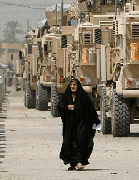
Back in January, the Bush administration proposed a Status of Forces Agreement to govern relations between American troops and the Iraqis after the U.N. mandate expires in December 2008. Both Barack Obama and Hillary Clinton accused the White House of trying to tie the hands of a future American president and many Democrats in Congress voiced the same concern. Even at the time, any agreement had to be less than a binding treaty, which would have required confirmation by an impossible two-thirds vote of the U.S. Senate.
Now, at the end of August, the Bush administration is still trying to cobble together a much-reduced memo of understanding with Iraqi Prime Minister Nouri al-Maliki, who is doing much of his negotiating through public statements. Even if he finally agrees to Washington’s terms, the deal would still be far from done. The Iraqi Parliament would still have to approve it, and the followers of Shi’a cleric Muqtada al-Sadr have already taken to the streets to express their opposition to what they’ve heard so far. In their view, the current understanding would turn Iraq into a U.S. colony.
In any case, the next U.S. president will feel free to work out with the Iraqis what to do about American troops and contract employees. Obama continues to believe American “combat troops” could withdraw “responsibly” by the end of 2010, while McCain has suggested they could leave “victoriously” by January 2013.
Iraqi and American officials have already revealed some of the latest terms, which remain full of slippery definitions. Depending on unspecified security milestones, all American troops would withdraw from Iraqi cities by June 30, 2009, while the new date for the removal of “combat forces” has now shifted from the previously leaked December 2010 to December 2011. Secretary of State Condoleezza Rice calls all this an “aspirational timetable,” not to be confused with setting a date for withdrawal, which President Bush and his political avatar John McCain have repeatedly condemned as a first step toward surrender.
Al-Maliki, on the other hand, wants Iraqis to believe any deal will call for the removal of ALL foreign troops, which hardly seems likely. The Bush administration is not at all ready to pull out completely, and al-Maliki himself still relies on American troops and other support to keep his government in power. So, the big questions remain unanswered: How many U.S. military advisers, trainers and other “non-combat” troops would stay in Iraq after “withdrawal?” And how many bases, permanent or otherwise, would remain in American hands?
In early June, Patrick Cockburn reported in Britain’s Independent that the Bush administration was demanding 50 military bases, along with control of Iraqi airspace and legal immunity for American personnel. Grand Ayatollah Ali al-Sistani condemned the demands as a violation of Iraqi sovereignty, and negotiations continued. Still, I suspect that the coming agreement — if it ever comes — could leave in Iraq as many as 30,000 to 50,000 American troops and contract employees. Bases would remain under U.S. control, perhaps with “legal ownership” nominally held by Iraq. And the Americans would continue to have access to more than enough air power to kill untold numbers of Iraqis.
In the small print, U.S. troops would likely remain under American jurisdiction, perhaps with the fig leaf of a joint US-Iraqi committee to oversee any judicial proceedings. And, in the name of fighting terrorists, the remaining U.S. forces — all “non-combat” by definition — would have some cosmetic restrictions on their right to arrest Iraqi citizens or launch military campaigns without consultation.
Cut through the spin, and this would be nothing more than a downsized occupation disguised as withdrawal, which few Iraqis or others in the Middle East would long accept. At best, Mr. Bush’s big deal would be a time bomb set to explode.
Democratic and Republican American policy-makers have greatly underestimated Arab outrage, both religious and nationalistic, against anything that smacks of the return of Western colonialism. Al-Qaeda, the Taliban, Hizbullah, and others have consistently won support on “the Arab street” by opposing the presence of American and allied militaries in Islamic countries. Hopefully, we will never shape our foreign or domestic policies by what radical jihadists demand. But, unless we’re suicidal, we had better learn to respond to what millions of their potential supporters want.
Iraq, like Vietnam, is a conflict where political realities on the ground will trump America’s overwhelming military force. Consider “the surge,” which Bush and McCain both see as a success. In military terms, they’re right — if we define the term to include ethnic cleansing and the U.S. military alliance with Sunni tribal leaders, a ploy that began well before any escalation of troops. In political terms, the surge failed. Iraqi leaders used the increased presence of American troops to avoid making compromises with their rivals, and now al-Maliki’s Shi’a-led government is attacking our Sunni allies. No wonder Gen. David Petraeus, who led the surge, sees any gains as fragile.
A deal to leave thousands of armed Americans in Iraq will similarly fail, no matter how many military victories those “non-combat” forces win. And any attempt to disguise their presence with wordplay will only add to Iraqi anger, accelerating America’s political defeat — and that of our Iraqi collaborators.Reprinted from truthout.org.






Leave a Reply